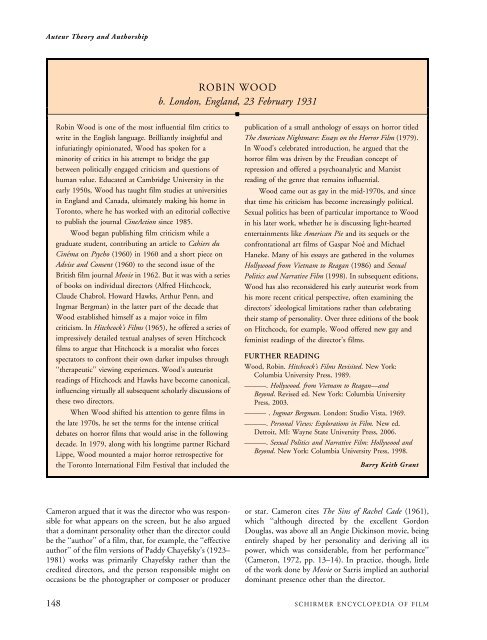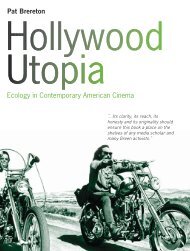Schirmer Encyclopedia of Film
Schirmer Encyclopedia of Film
Schirmer Encyclopedia of Film
Create successful ePaper yourself
Turn your PDF publications into a flip-book with our unique Google optimized e-Paper software.
Auteur Theory and Authorship<br />
Robin Wood is one <strong>of</strong> the most influential film critics to<br />
write in the English language. Brilliantly insightful and<br />
infuriatingly opinionated, Wood has spoken for a<br />
minority <strong>of</strong> critics in his attempt to bridge the gap<br />
between politically engaged criticism and questions <strong>of</strong><br />
human value. Educated at Cambridge University in the<br />
early 1950s, Wood has taught film studies at universities<br />
in England and Canada, ultimately making his home in<br />
Toronto, where he has worked with an editorial collective<br />
to publish the journal CineAction since 1985.<br />
Wood began publishing film criticism while a<br />
graduate student, contributing an article to Cahiers du<br />
Cinéma on Psycho (1960) in 1960 and a short piece on<br />
Advise and Consent (1960) to the second issue <strong>of</strong> the<br />
British film journal Movie in 1962. But it was with a series<br />
<strong>of</strong> books on individual directors (Alfred Hitchcock,<br />
Claude Chabrol, Howard Hawks, Arthur Penn, and<br />
Ingmar Bergman) in the latter part <strong>of</strong> the decade that<br />
Wood established himself as a major voice in film<br />
criticism. In Hitchcock’s <strong>Film</strong>s (1965), he <strong>of</strong>fered a series <strong>of</strong><br />
impressively detailed textual analyses <strong>of</strong> seven Hitchcock<br />
films to argue that Hitchcock is a moralist who forces<br />
spectators to confront their own darker impulses through<br />
‘‘therapeutic’’ viewing experiences. Wood’s auteurist<br />
readings <strong>of</strong> Hitchcock and Hawks have become canonical,<br />
influencing virtually all subsequent scholarly discussions <strong>of</strong><br />
these two directors.<br />
When Wood shifted his attention to genre films in<br />
the late 1970s, he set the terms for the intense critical<br />
debates on horror films that would arise in the following<br />
decade. In 1979, along with his longtime partner Richard<br />
Lippe, Wood mounted a major horror retrospective for<br />
the Toronto International <strong>Film</strong> Festival that included the<br />
Cameron argued that it was the director who was responsible<br />
for what appears on the screen, but he also argued<br />
that a dominant personality other than the director could<br />
be the ‘‘author’’ <strong>of</strong> a film, that, for example, the ‘‘effective<br />
author’’ <strong>of</strong> the film versions <strong>of</strong> Paddy Chayefsky’s (1923–<br />
1981) works was primarily Chayefsky rather than the<br />
credited directors, and the person responsible might on<br />
occasions be the photographer or composer or producer<br />
ROBIN WOOD<br />
b. London, England, 23 February 1931<br />
publication <strong>of</strong> a small anthology <strong>of</strong> essays on horror titled<br />
The American Nightmare: Essays on the Horror <strong>Film</strong> (1979).<br />
In Wood’s celebrated introduction, he argued that the<br />
horror film was driven by the Freudian concept <strong>of</strong><br />
repression and <strong>of</strong>fered a psychoanalytic and Marxist<br />
reading <strong>of</strong> the genre that remains influential.<br />
Wood came out as gay in the mid-1970s, and since<br />
that time his criticism has become increasingly political.<br />
Sexual politics has been <strong>of</strong> particular importance to Wood<br />
in his later work, whether he is discussing light-hearted<br />
entertainments like American Pie and its sequels or the<br />
confrontational art films <strong>of</strong> Gaspar Noé and Michael<br />
Haneke. Many <strong>of</strong> his essays are gathered in the volumes<br />
Hollywood from Vietnam to Reagan (1986) and Sexual<br />
Politics and Narrative <strong>Film</strong> (1998). In subsequent editions,<br />
Wood has also reconsidered his early auteurist work from<br />
his more recent critical perspective, <strong>of</strong>ten examining the<br />
directors’ ideological limitations rather than celebrating<br />
their stamp <strong>of</strong> personality. Over three editions <strong>of</strong> the book<br />
on Hitchcock, for example, Wood <strong>of</strong>fered new gay and<br />
feminist readings <strong>of</strong> the director’s films.<br />
FURTHER READING<br />
Wood, Robin. Hitchcock’s <strong>Film</strong>s Revisited. New York:<br />
Columbia University Press, 1989.<br />
———. Hollywood. from Vietnam to Reagan—and<br />
Beyond. Revised ed. New York: Columbia University<br />
Press, 2003.<br />
——— . Ingmar Bergman. London: Studio Vista, 1969.<br />
———. Personal Views: Explorations in <strong>Film</strong>. New ed.<br />
Detroit, MI: Wayne State University Press, 2006.<br />
———. Sexual Politics and Narrative <strong>Film</strong>: Hollywood and<br />
Beyond. New York: Columbia University Press, 1998.<br />
Barry Keith Grant<br />
or star. Cameron cites The Sins <strong>of</strong> Rachel Cade (1961),<br />
which ‘‘although directed by the excellent Gordon<br />
Douglas, was above all an Angie Dickinson movie, being<br />
entirely shaped by her personality and deriving all its<br />
power, which was considerable, from her performance’’<br />
(Cameron, 1972, pp. 13–14). In practice, though, little<br />
<strong>of</strong> the work done by Movie or Sarris implied an authorial<br />
dominant presence other than the director.<br />
148 SCHIRMER ENCYCLOPEDIA OF FILM
















